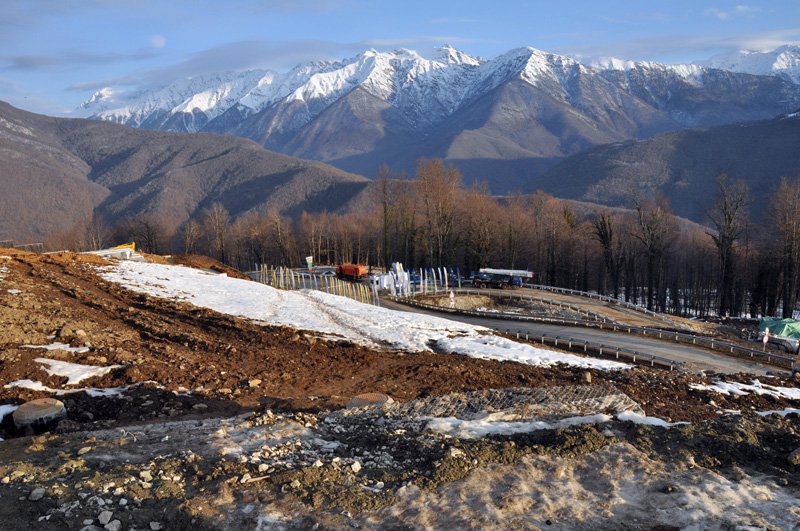
Words & photos: Ethan Stone
Feel da riddim!
Feel da rhyme!
Get on up
Seriously, is there any better way to get into the Olympic spirit than to watch the movie "Cool Runnings"? If there is, I haven't heard of it. And I don't think it's a coincidence that the story of the Jamaican bobsled team is currently one of the entertainment selections on trans-Atlantic flights.
The happy-go-lucky Jamaicans help get me stoked for my ultimate destination during my flight from Atlanta to Munich - two stops along my journey from Oregon to Sochi to cover the Olympics for Newschoolers.
Yes, Atlanta and Munich are former Olympic host cities, making my trip a de facto Olympic tour. And they are also both cities that saw violence and bloodshed during their Games.
Would you consider that a bad omen for the Olympics that I'm on my way to now? Consider as you will; I don't believe in that bad ju-ju.
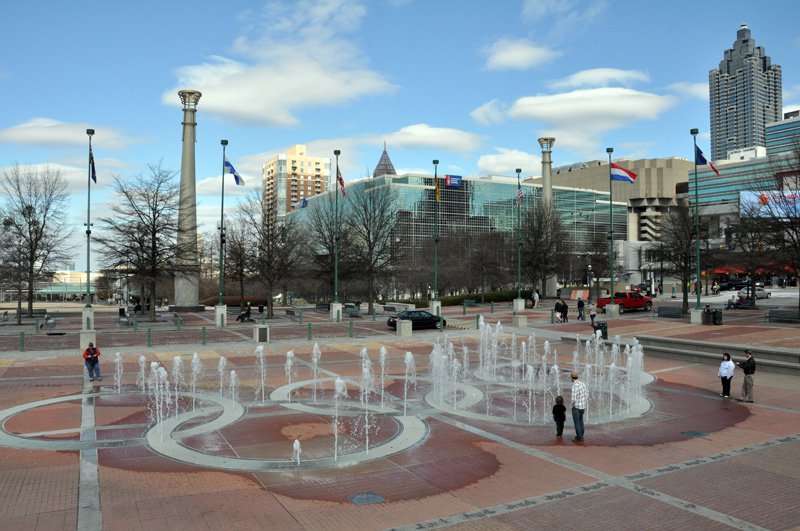
Atlanta's Centennial Olympic Park - stop one on my Olympic tour.
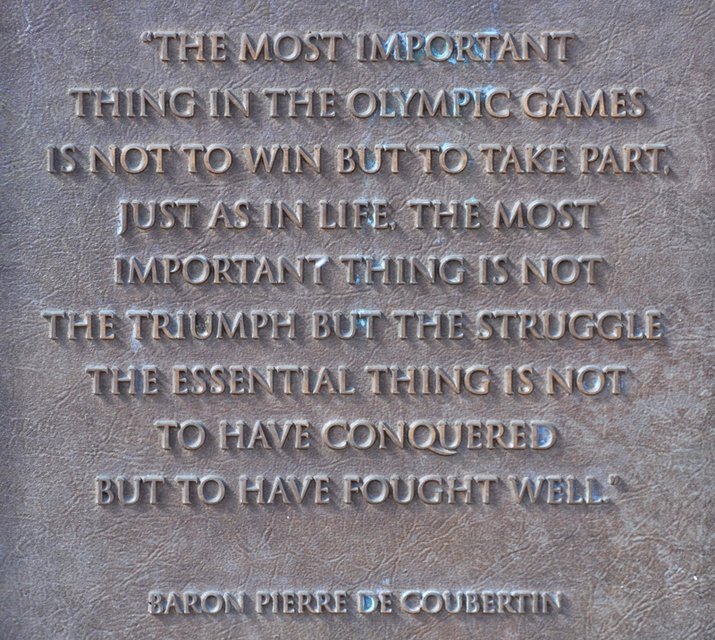
A quotation from "the founder of the modern Olympic movement." Do you agree or disagree with his sentiment?
After a solid 48 hours of flights and layovers, finally a glimmer of light appears on the distant shore, far below my third and final flight. I've reached the vortex currently sucking up all the attention in the freeskiing world. Hello, Sochi.
For all the publicity that Sochi has been getting lately, how many of you can actually point out its location on a map? Allow me to indulge in a brief geo-history lesson.
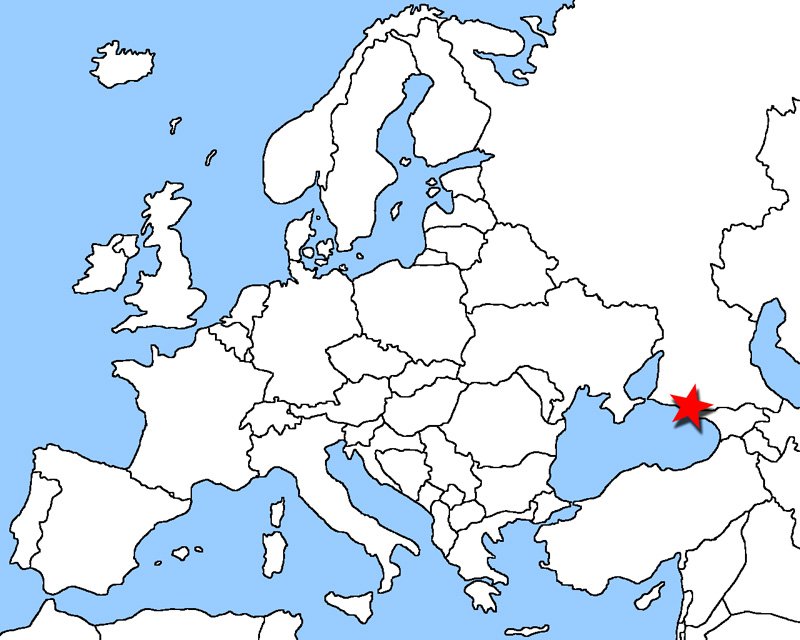
Sochi is located on the eastern shore of the Black Sea in southwestern Russia, in a region known as the Caucasus. This area is defined by the Caucasus Mountains, a rugged and remote range stretching from the Black Sea in the west to the Caspian Sea in the east. Depending on where you like to draw the line between Europe and Asia (it's a subject of some contention), the Caucasus might be home to Europe's highest mountain: 18,510-foot (5,642m) Mt. Elbrus, a solid three thousand feet higher than the Alps' Mont Blanc.
Understanding Sochi's location is essential to understanding why everyone's so worried about terrorism at these Games. As an important connection between the Middle East and Eurasia, the Caucasus region has been fought over for millennia. For much of its history the area was associated with empires and kingdoms to the south such as the Iranian Empire; only relatively recently (the past few hundred years) did the Caucasus become a Russian possession. And Russia's hold on the region is still tenuous.
The diverse ethnic groups that populate the Caucasus have never jived well with Russian rule. According to Wikipedia, close to a million Chechens, Ingush, Balkars and Karachays were mass-deported to Siberia during the 1940s. Generally speaking, that doesn't make people happy.
When the Soviet Union collapsed in 1991, several Caucasian states—Geogia, Azerbaijan and Armenia—became independent. Other would-be states were not so lucky, and found themselves facing the pointy end of the Russian sword when they attempted their own independence.
I vividly remember following the news about the Chechen Wars in the '90s and 2000s, when Russian troops regained control of the quasi-independent state of Chechnya. The fighting razed the capital city of Grozny to the ground as Russian forces brutally hammered rebels and civilians alike with artillery and ballistic missile strikes. When the smoke cleared, the United Nations called Grozny "the most destroyed city on Earth."
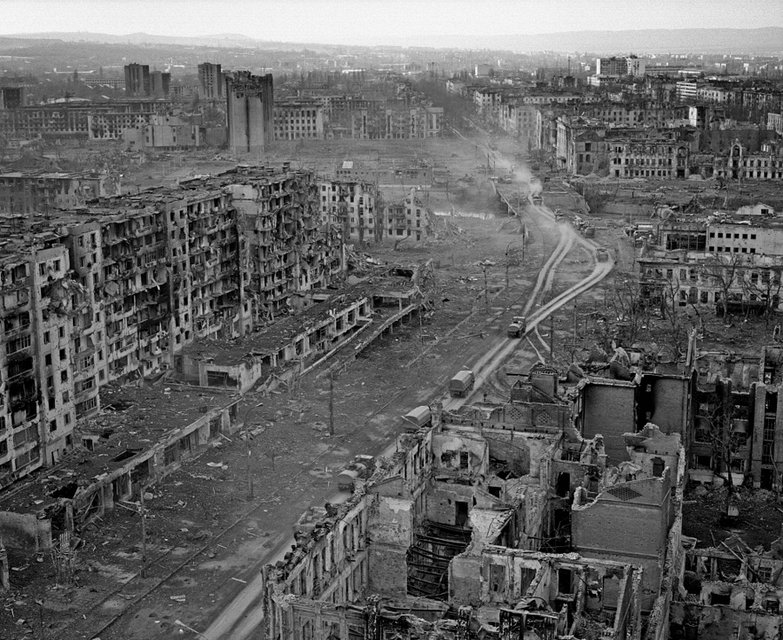
Grozny in March 1995. Photo courtesy worldcuphumanrights.blogspot.com
Again: this is no way to go about making friends. Though Russia has successfully retained control of much of the Caucasus, a festering insurgency still lingers here. This makes the Olympic Games in Sochi a big, fat target for anyone that's looking to re-open the discussion of who's really in control of the Caucasus.
Like many others who have visited Russia, my first taste of the country is that of beaurocracy. My birthdate has been misprinted on my Olympic Identity and Accreditation Card, reason enough to hold me in customs for over an hour before purchasing a new Russian visa for 3,000 rubles (don't worry, it's only about 85 bucks) to correct the error.
Though Russians are often stereotyped as being reserved or rude, my experience thus far is anything but. I even make friends with one of the customs officers detaining me. By the time we're done, I've got a new Instagram follower and my pyer-vih russki drugga - my first Russian friend!
I am met at the airport by fellow Newschoolers member Rachel Manning, who's volunteering at the Games in the mountain press center. She helps me navigate the maze of transportation up to the Mountain Cluster, 40km from the coast, where the alpine events are being held. At around one in the morning I finally make it to my hotel, accessed via gondola on the side of a mountain, and make a great first impression on my roommate Robin by pounding on the door of the room until he wakes up to let me in.
The next morning it's time to get up and check this place out. Gorky Village, where my hotel is located, is an eerily deserted ghost town, a small conglomeration of built and half-built hotels and shops that doesn't seem to harbor a single Olympic visitor besides the few in our hotel. The only people I see are sullen-faced workers who all seem to be employed purely to sweep up the dirt from the sidewalks in front of shuttered, half-finished buildings. Our hotel seems to be one of the only ones up here that was completed in time for the Games -- and it just opened two weeks ago.
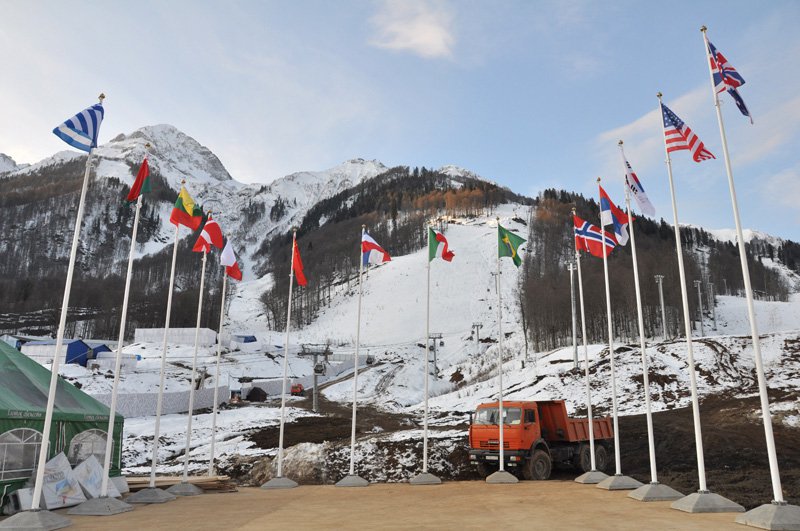
One of Nate Abbott's beloved Kamaz trucks.
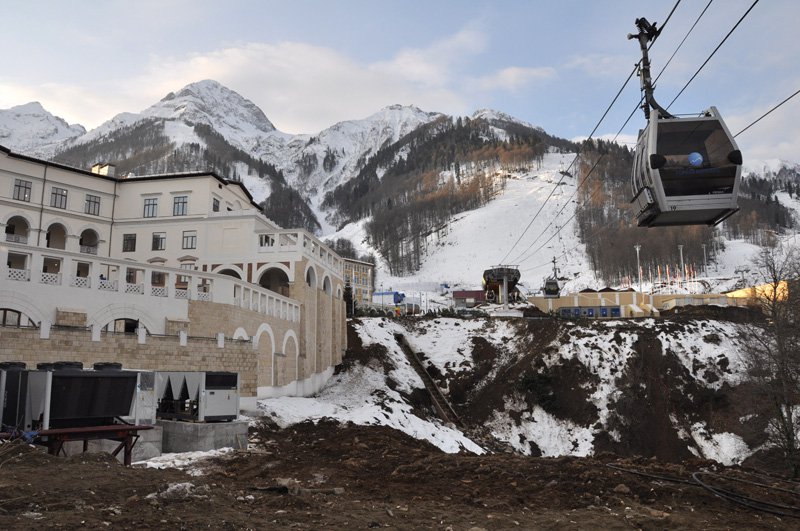
Gorky Village: still rough around the edges.
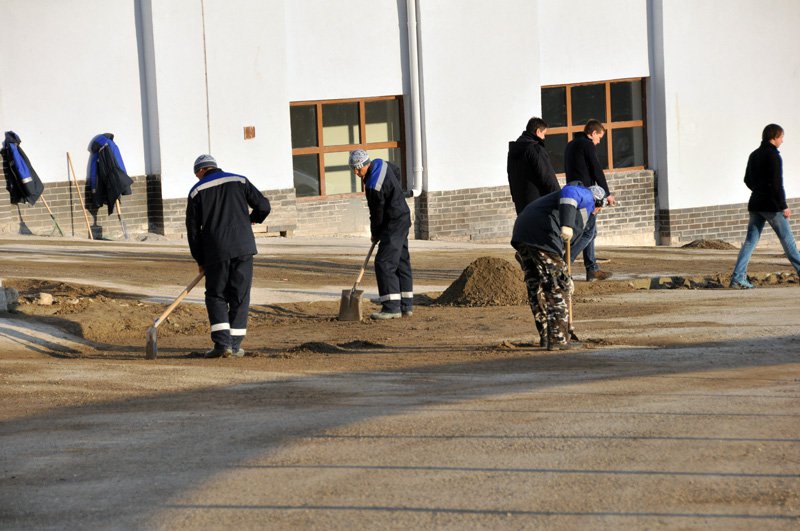
Manual labor: somebody get these guys a street sweeper.
After a morning stroll through Gorky Village, I once again take to the transportation system, descending back down to the main village of Gorky, where thankfully people are out and about on their way to various venues. I navigate to the Rosa Khutor Extreme Park to scope out the facilities for halfpipe and slopestyle. As I travel up the valley by bus, foot and gondola, I finally get to experience first-hand the extent of development and destruction so poignantly described by the "Red Pow" feature in Powder magazine -- not to mention the rest of the world media. Everywhere I look there is rubble, dirt and stray dogs. Roads haphazardly carved across the valley have turned hillsides -- nay, mountainsides -- into thrashed, eroding slopes of mud. You don't have to be an engineer to know that erosion is going to be a major problem here in years to come.
As luck would have it, ski slopestyle practice is underway when I arrive at Rosa Khutor, so I get a few hours to watch freeskiing's Olympic slopestylers roll through the course.
The jumps are as huge as they appeared in photos and video -- double flips on the last booter look impossibly slow and smooth, with plenty of room for an extra flip if one so desires. The rail section up top is quirky but functional, anchored by a giant and apparently unjibbable Matryoshka doll. Today is sunny and balmy, and the icy man-made snow is finally softening up to some competitors' delight. The ladies are preparing for their slopestyle final tomorrow, February 11, the guys with a bit more breathing room before their final on February 13.
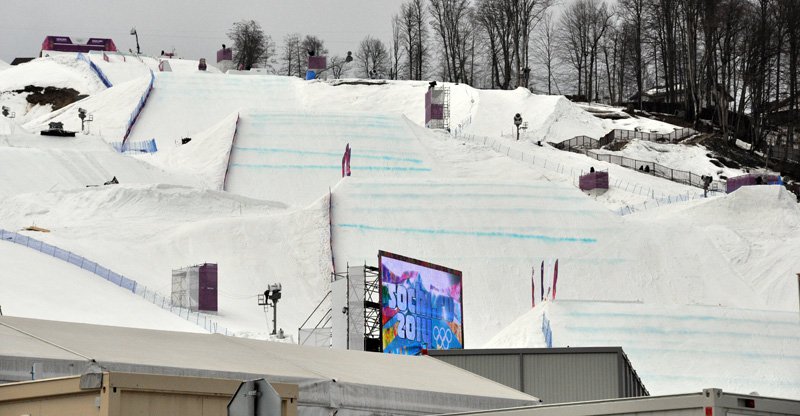
The slope course from below.
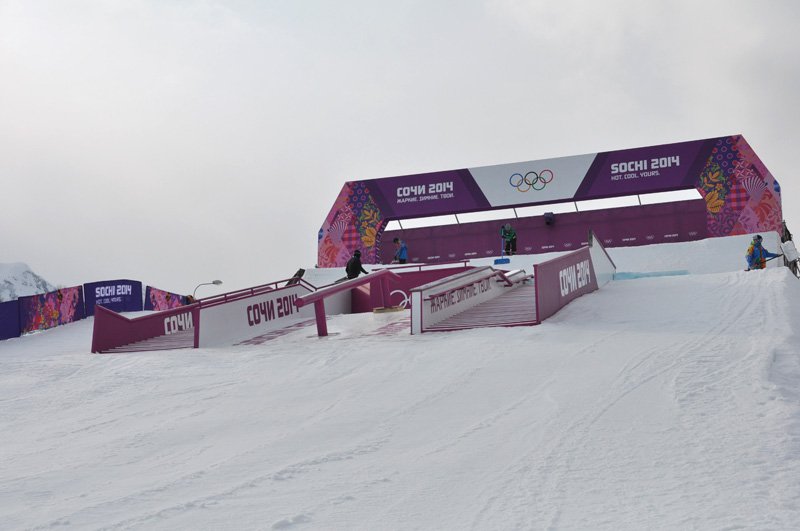
Drop-in and first rail tier.
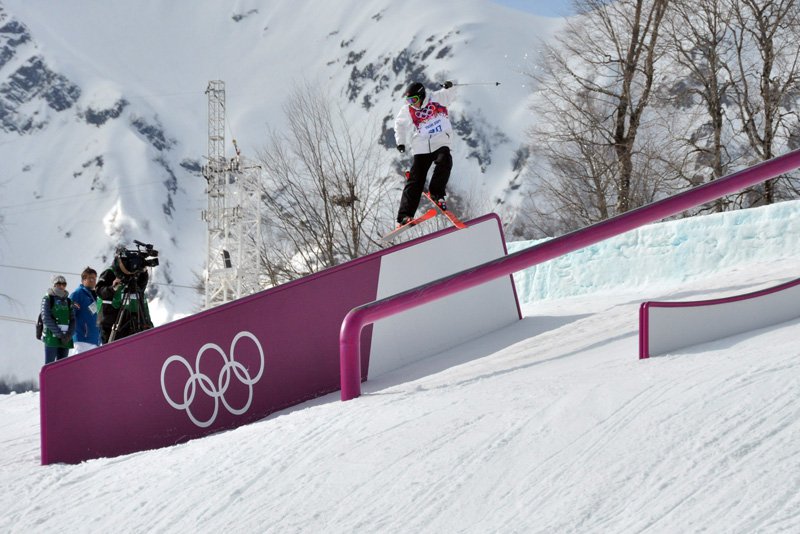
A Norwegian competitor, switch 2 in the second rail tier.
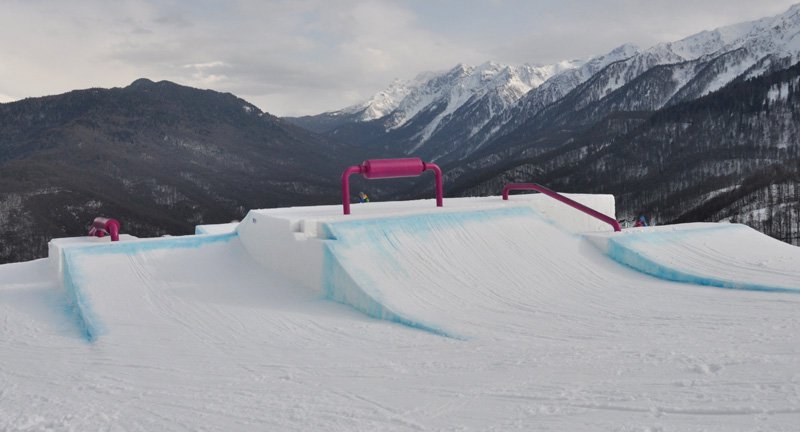
The second rail tier from above.
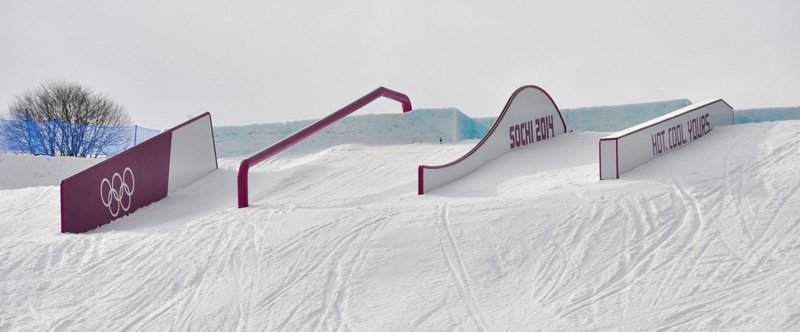
Second rail tier from below.
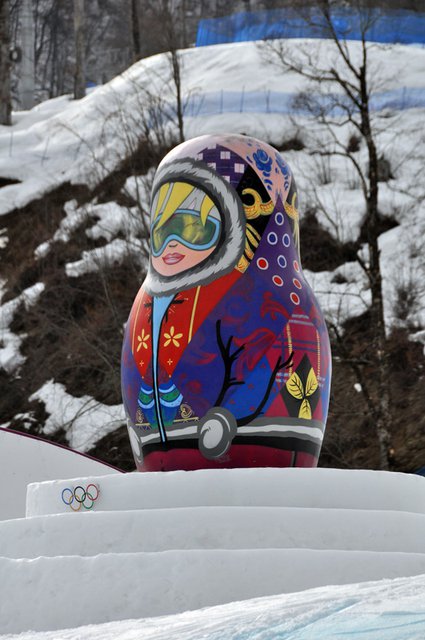
Giant Matryoshka doll on the third rail tier. Are there five smaller ones inside?
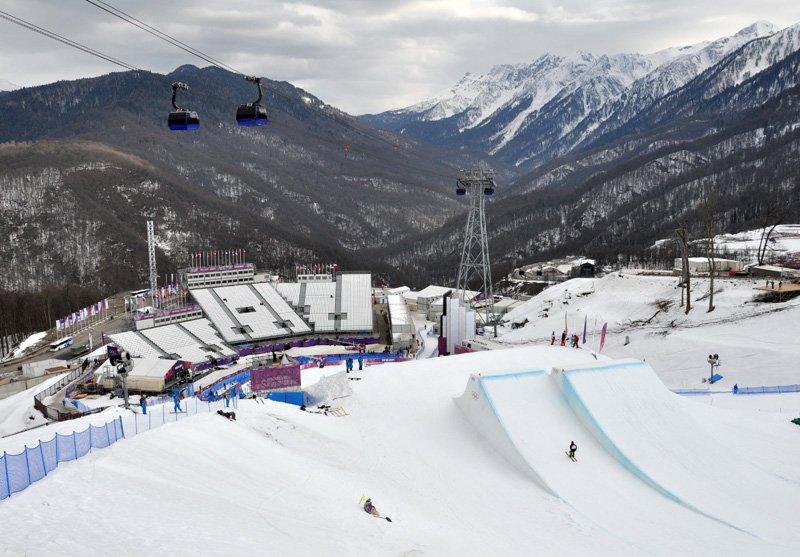
The massive third and final jump leading into the stadium finish area.
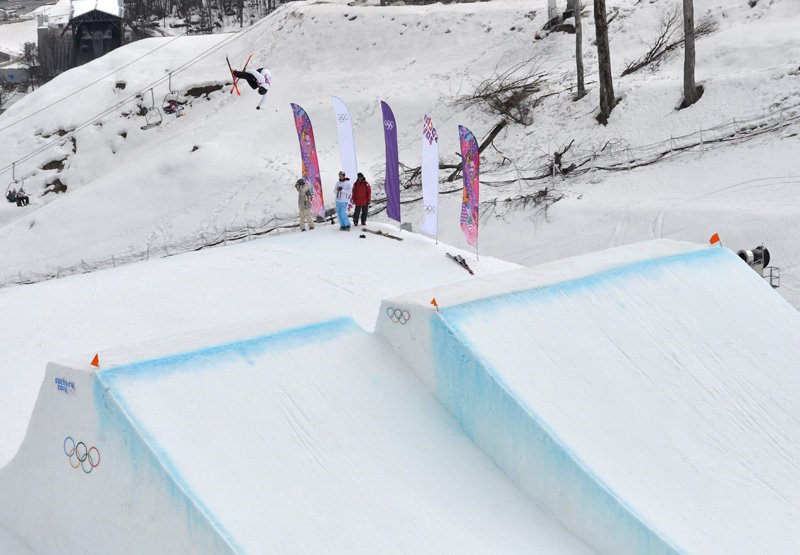
Team Norway on Jump 3.
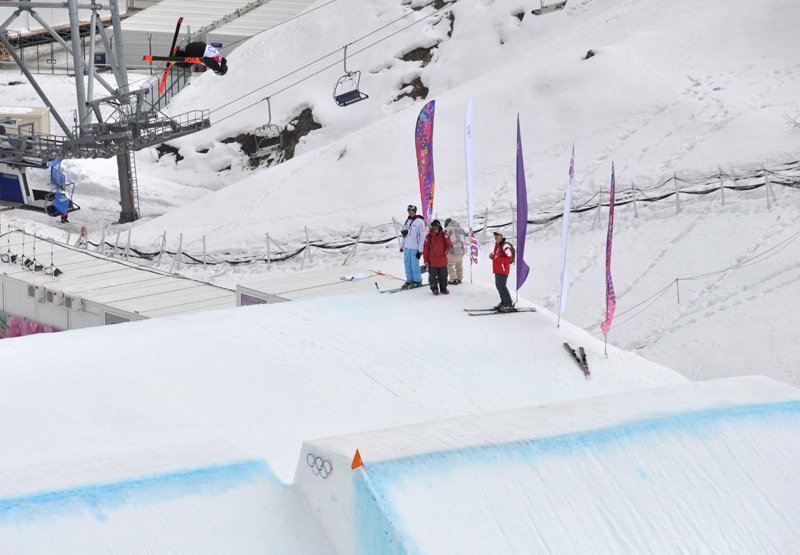
A smooth 540 blunt -- watching practice is almost more fun than watching the comp sometimes.
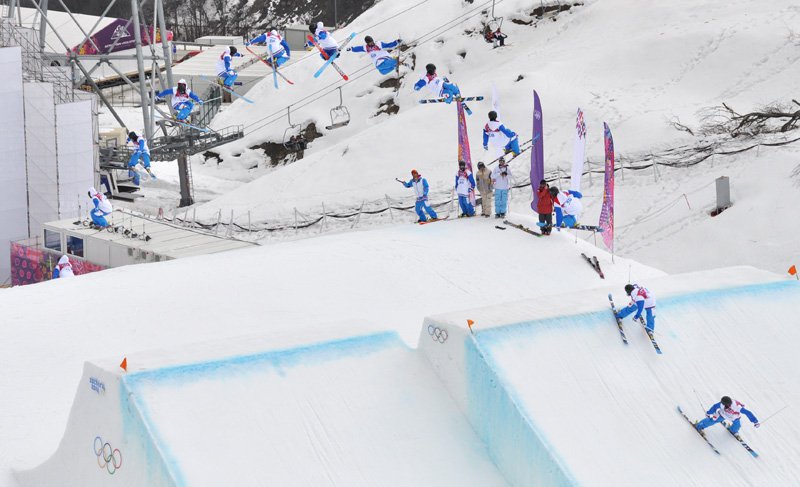
Beauty of a switch bio 900 - is that the Czech Olympic uniform?
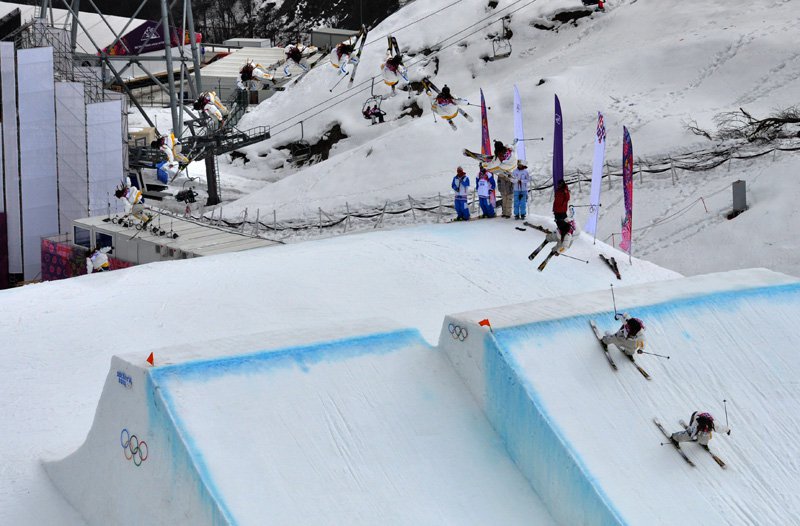
Henrik Harlaut working on his switch rightside spins.
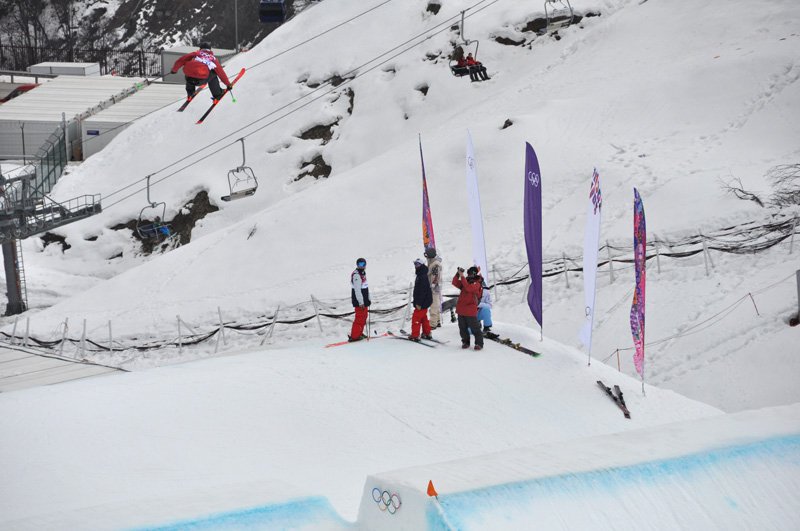
Alex Beaulieu-Marchand hangs out a switch dub.
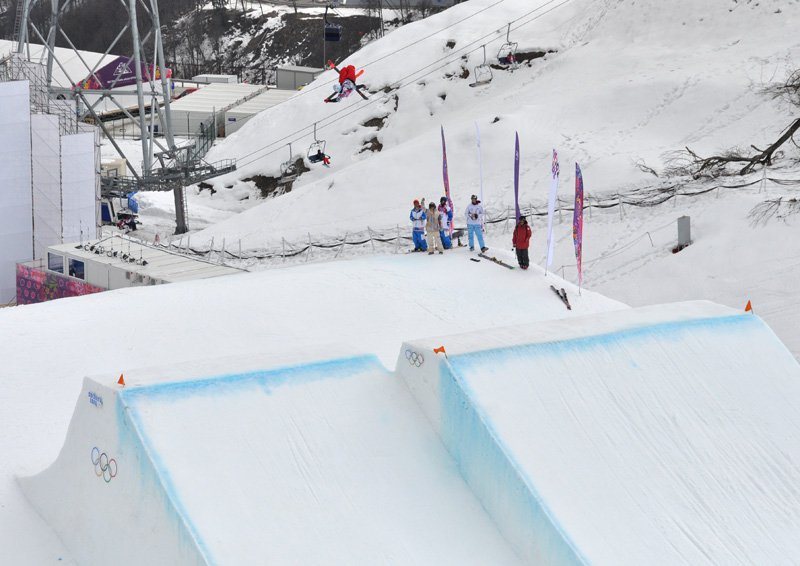
Nick Goepper warming up a cork 7 blunt.
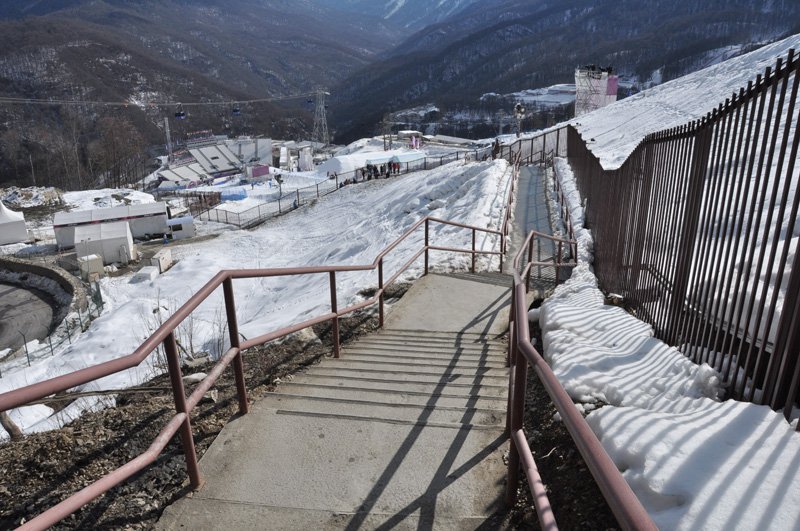
This stairset runs alongside the slopestyle course from top to bottom. Tempting....
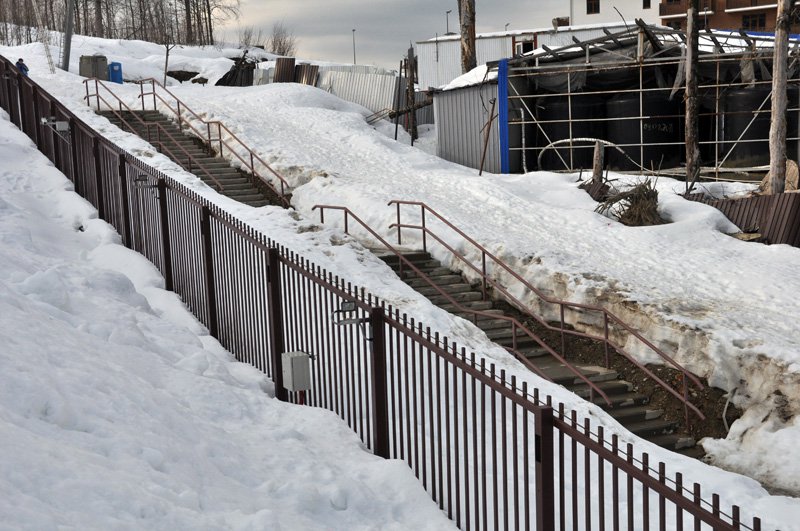
Double set right next to the slope course. Just saying.... #jibtheolympics
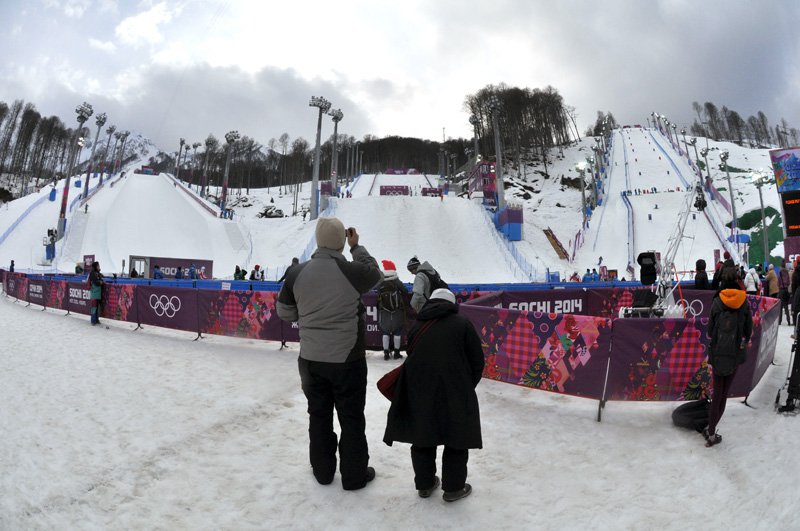
A Russian couple admires the HAM venue.
After briefly scoping the "HAM" venue (halfpipe, aerials, moguls) before the start of tonight's men's moguls final, I head towards home, still marveling at the ravaged beauty of this place, and the fact that somewhere, somehow a single organization is responsible for all of this development -- this destruction -- this perpetration of world sports on a once quiet and peaceful mountain valley. Despite it all, the Games go on -- in the time it's taken me to gain my bearings in the mountain cluster, I've already missed out on the action going on in curling / luge / hockey / biathlon / speed skating / combined slalom / and so on. It's just too much for one guy to take in. No wonder the other news organizations are here with veritable armies of writers, photographers, videographers and editors to capture all the action. But don't worry Newschoolers - I got you covered!
That's it for update #1. In about three hours the women's slope qualifications will start at 10am local time, followed by finals at 1pm (1:00am EST and 4:00am EST respectively). Stay tuned for a full report!
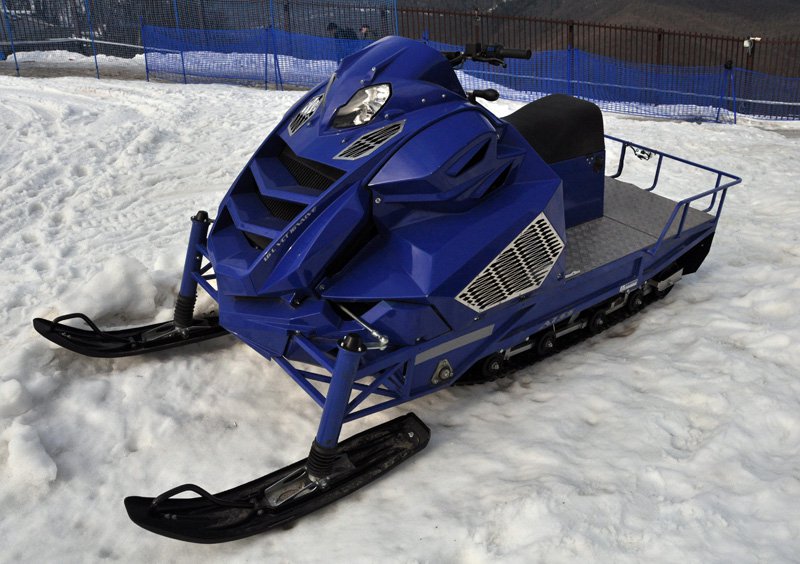
I'm not sure what this is... but I think I want one.

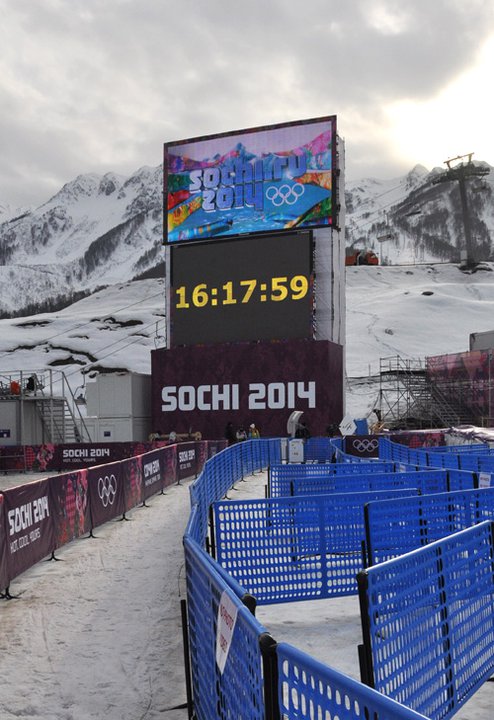
Comments